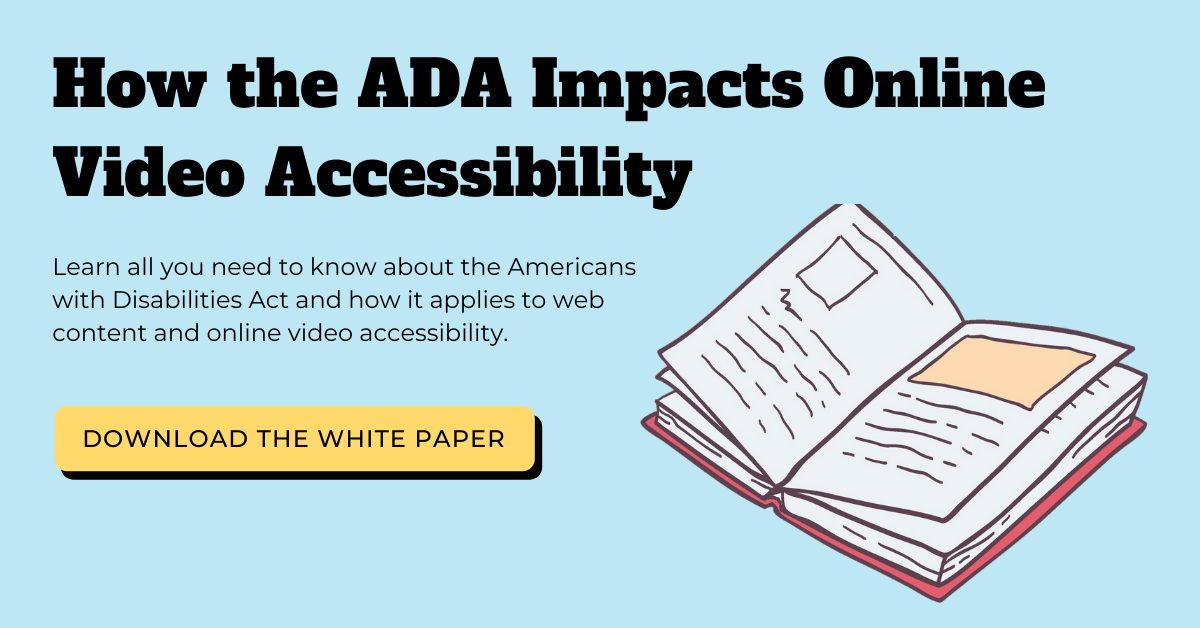Overview of NAD v. Harvard and NAD v. MIT Lawsuits
Updated: March 13, 2024
On Thursday, February 5, 2015, the National Association of the Deaf (NAD) filed a federal class-action lawsuit against the Massachusetts Institute of Technology (MIT) and Harvard University for allegedly violating U.S. accessibility laws.
Please note that as of February 2020, after years of litigation, both the NAD v. Harvard and NAD v. MIT lawsuits have officially been settled by the court of law.
Behind the NAD v. Harvard and NAD v. MIT Lawsuits
For both the Harvard and MIT lawsuits, the NAD cited violations of the Americans with Disabilities Act (ADA) and the Rehabilitation Act. The universities’ alleged failure to provide appropriately accurate and comprehensive captioning for online course materials was the driving force behind the suit brought forth by the NAD.
Allegedly Inaccessible Content
Both Harvard and MIT provide free online programming, which includes videos and audio files for educational lectures and “topics of general interest.” The universities also have extensive materials available for free on several online platforms, such as YouTube, iTunesU, Harvard@Home, and MIT OpenCourseWare. Both universities are the founding partners of edX, a nonprofit that offers dozens of MOOCs, or massive open online courses, free to students around the world.
In the NAD v. Harvard and NAD v. MIT lawsuits, the NAD claimed that Harvard and MIT denied people who are deaf and hard of hearing equal access to the universities’ free online programming.
Notably, these lawsuits were the first of their kind to address the accuracy and quality of the captions provided. Much of the universities’ online media is published on platforms like YouTube, whose auto-captioning function is woefully insufficient for the hard of hearing.
Why Did the NAD Sue?
The NAD sued Harvard and MIT due to concerns that the universities were not providing equal access to online programming for students with disabilities, which is in direct violation of principles within accessibility laws. Ideally, a ruling from the courts would ensure that all content from the universities was made accessible to students with disabilities moving forward.
In addition to ensuring accessibility for Harvard and MIT’s online programming, a firm ruling from the courts would likely pressure other universities to comply with stricter captioning standards and also provide much-needed guidance for closed captioning and other web accessibility requirements.
Deep Dive Into the ADA
This brief examines the ADA through the lens of online video accessibility and provides insight into developments, resources, and guidance for online video accessibility.
The Settlements
As of February 2020, the NAD v. Harvard and NAD v. MIT lawsuits have each settled through consent decrees.
According to the NAD, both settlements represent “the most comprehensive set of online accessibility requirements in higher education and provide[s] a new model for ensuring worldwide online and digital accessibility in academia and business for people who are deaf and hard of hearing.”
NAD v. Harvard Settlement
On November 27, 2019, after four years of litigation, both the NAD and Harvard University came to a mutual agreement through a consent decree. The settlement strengthened Harvard’s new digital accessibility policy and was effective as of December 1, 2019.
This settlement established set captioning guidelines so that Harvard University can continue to improve accessibility for its online resources for those who are deaf or hard of hearing.
Though Harvard does and has been captioning much of its online content, this agreement “ensures for the first time that the university will provide high-quality captioning services for online content.” In fact, the terms of the agreement reference 3Play Media as a pillar for caption quality and notes that captions must have “an accuracy rate equal to that offered by a vendor captioning service such as 3PlayMedia.”
NAD v. MIT Settlement
On February 18, 2020, the NAD announced that it had reached a settlement with MIT in regards to the 2015 class-action lawsuit. The terms of the NAD v. MIT settlement are similar to the agreement between the NAD and Harvard.
According to the NAD, the settlement “institutes a series of new guidelines to make the university’s website and online resources accessible for people who are deaf and hard of hearing.”
Harvard’s and MIT’s Stance on Accessibility
In Harvard’s online accessibility statement, the university states its commitment to providing accessible online materials for all students. It continues to acknowledge accessibility as “integral to the academic and administrative work of the University.”
MIT’s online accessibility statement iterates that “MIT is committed to providing an environment that is accessible to individuals with disabilities.”
3Play Media continues to work with MIT, Harvard, and edX to provide captioning and transcription services. For example, the Harvard School of Public Health added interactive transcripts to online video material. MIT OpenCourseWare and other groups like MIT150 not only captioned their videos but also made them searchable to improve the learning experience for all students.
The outcomes of the NAD v. Harvard and NAD v. MIT lawsuits have set precedent to hold colleges and universities accountable for providing captioning for their online video content. It’s important to gain knowledge of accessibility laws like the American with Disabilities Act and to understand how they may impact online accessibility obligations at your university.
This post was originally published in February 2015 by Emily Griffin. It has since been updated for clarity, freshness, and comprehensiveness.
Further Reading

Subscribe to the Blog Digest
Sign up to receive our blog digest and other information on this topic. You can unsubscribe anytime.
By subscribing you agree to our privacy policy.










